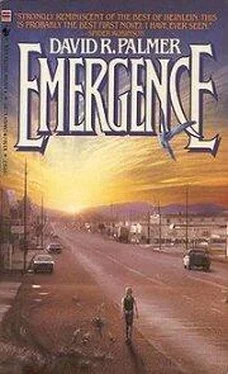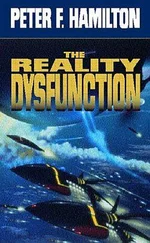David Palmer - Emergence
Здесь есть возможность читать онлайн «David Palmer - Emergence» весь текст электронной книги совершенно бесплатно (целиком полную версию без сокращений). В некоторых случаях можно слушать аудио, скачать через торрент в формате fb2 и присутствует краткое содержание. Год выпуска: 1984, ISBN: 1984, Издательство: Bantam Spectra, Жанр: Фантастика и фэнтези, на английском языке. Описание произведения, (предисловие) а так же отзывы посетителей доступны на портале библиотеки ЛибКат.
- Название:Emergence
- Автор:
- Издательство:Bantam Spectra
- Жанр:
- Год:1984
- ISBN:0-553-25519-3
- Рейтинг книги:3 / 5. Голосов: 1
-
Избранное:Добавить в избранное
- Отзывы:
-
Ваша оценка:
- 60
- 1
- 2
- 3
- 4
- 5
Emergence: краткое содержание, описание и аннотация
Предлагаем к чтению аннотацию, описание, краткое содержание или предисловие (зависит от того, что написал сам автор книги «Emergence»). Если вы не нашли необходимую информацию о книге — напишите в комментариях, мы постараемся отыскать её.
Won Compton Crook Award in 1985.
Nominated for Nebula Award for Best Novel in 1984.
Nominated for Hugo Award for Best Novel in 1985.
Finalist of Philip K. Dick Award in 1984.
Nominated for Locus Award for best first novel and best SF Novel in 1985.
Emergence — читать онлайн бесплатно полную книгу (весь текст) целиком
Ниже представлен текст книги, разбитый по страницам. Система сохранения места последней прочитанной страницы, позволяет с удобством читать онлайн бесплатно книгу «Emergence», без необходимости каждый раз заново искать на чём Вы остановились. Поставьте закладку, и сможете в любой момент перейти на страницу, на которой закончили чтение.
Интервал:
Закладка:
Whereupon, gingerly stood, paused briefly to verify balance in working order; then employed selfsame care, very short steps, to navigate slowly to door.
Hall in which found self was higher-ceilinged, wider than those in houses which constituted experience during formative years. Decor, too, beyond what have come to recognize as norm.
Piano now into first measures of unfamiliar solo transcription of Wagner’s Rienzi overture. Stood briefly, listened.
(Daddy included in shelter collection essentially entire Andre Perrault international catalog; record collection upstairs in house almost equaled. Have myself spent important fraction of short life exposed to, absorbing, enjoying classical music. Plus Daddy once took me to Horowitz concert in Chicago, where, in three too-short hours, artist demonstrated all he’d learned about playing piano over perhaps 70-odd years of training, practice, dedication. Have, despite youth, acquired discerning ear.)
This pianist good. Possibly even that good. But didn’t recognize touch. Wondered who might be; when recording made.
Followed music down hall to balcony — from either end of which descended wide, sweeping staircase (of sort on which Cinderella lost slipper), terminating in foyer into which Daddy’s whole house would fit without crowding (if tucked to side to miss chandelier).
Glided down nearer staircase, feeling like figure in dream. Music coming from partially open door on far side of foyer. Crossed room, silently pushed door open.
Terry’s tee stand stood next to gleaming ebony concert grand at center of library/study whose shelves held books in numbers rivaling perhaps even Daddy’s shelter library — and all hardbacks, most leather. Harebrained sibling himself (alive!) relaxed on one foot, raptly watching, listening as my erstwhile patient, leg bandaged but now unsplinted, played and music flowed through room, filling heart, crumbling barriers behind which had thought those emotions safely locked away forever.
Moved silently into room; held out arm. Twin’s eyes snapped wide; almost leaped in eagerness to swarm aboard. Settled in chair just behind, to side of oblivious musician. Terry discharged immediate hysterical gladness over reunion through series of head dives, cheek rubs; then snuggled down in lap, pressed close, sighed, closed eyes. Held my baby brother tight in arms.
And, soundlessly, cried. Cried for Momma, for Daddy; for unknown, unremembered flesh-and-blood parents; for Teacher; for all my friends; for acquaintances; for whole world of strangers — cried for all dead.
Cried for Terry, miraculously alive when should have burned to death. Cried for boy — another person! — incredibly still alive in spite of crash, terrible wounds, my bumbling treatment, fire — sitting now at piano, playing as composer only might have dared to dream.
Cried for me — for grief, for relief, for joy.
Cried for past. Cried for future. Cried for hope.
Cried while boy finished Rienzi , swept into Rachmaninoff, Chopin, Brahms, many others; all from memory, most full orchestral works somehow transcribed for piano alone; all played as if keyboard itself were come to life, complete with soul demanding outlet, expression.
Boy finished Berlioz’s Symphonie Fantastique with marvelously cacaphonic climax whose violence quite made up for missing orchestra; tiptoed with startling gentleness into Pachelbel’s Canon in D. And into resultant sweet tranquility he spoke; voice low, tightly controlled: “I thought you were dead.”
Didn’t reply — correction: Couldn’t.
“Terry woke me trying to rouse you — he and I have become friends waiting for you, and I’ve had time to read your journal. He was down from his stand, scrambling all over you, flapping his wings, pulling at you desperately, nuzzling you, screaming at you. That’s what woke me up.”
Lapsed into silence for long moments, music flowing without pause. “The whole block next to us was in flames. The heat was incredible and wreckage was coming down all around us. The street was filling up with burning debris and the building on the other side was starting to go as well — it looked like something out of an old movie of London during the Blitz.”
Again fell silent, moving bandaged leg restively, but music never hesitated. “I had a hell of a time getting into the driver’s seat with my leg in that splint, not to mention maneuvering the I.V. hose and pouch; and I knew I’d better leave it in place — I was weak as a kitten, and the blood all over the place made it obvious why. Finally I hung the I.V. pouch on the rear-view mirror, stuck the leg out the window, and used my right leg to drive. It wasn’t easy, shifting an unfamiliar transmission without using the clutch. I don’t think I hurt it.
“I got us out of there and came home. I thought you were dead.” Music soared gently, filling lengthening silence with beauty, while boy’s breathing rate mounted visibly, settled gradually. Only quarter profile visible from own vantage, but wet cheek’s glint unmistakable. Yet when resumed, voice was still almost conversational.
“You looked dead. You were grayish-white and you didn’t appear to be breathing at all. Terry wouldn’t let me touch you at first; he crouched on your body, wings half-spread, feathers fluffed to make him seem three times life-size, neck outstretched, that huge hooked bill open and threatening, and making a noise in his throat that…
Voice trailed off, but fingers never faltered.
“…that reminded me of the sound my mother made when she found my father’s body. He was the first to go in the plague.” Tendons stood out in neck, but music continued unbroken.
“I thought you were dead; so I concentrated on trying to comfort Terry, soothing him, getting him to accept me, to come to me. Only after that was I able to attend to you — and notice that you were still perspiring. I had never heard of a dead person perspiring — I’ve never seen anyone sweat like that — so I brought you inside, got you cleaned up, and put you to bed.
“You were running an astonishing temperature for a live person — the books I’ve read suggest that people don’t survive at 109 degrees, and it didn’t seem very likely that you’d manage it much longer — so I packed you in ice and started an I.V. to put back some of that water sluicing off you. I wired you to our EKG -
“Oh, yes, we have a fully equipped emergency room here in the house. This was the kind of neighborhood, back when we had lots of fussy, hypochondriac old neighbors and relatives, where one couldn’t afford to be without one; it would get you talked about, at the very least, and more likely disinherited. All the house staff were required to be fully conversant with the use of all the equipment, just in case.
“And while there was a stigma attached to people who possessed those skills — menial work, you know, performed by the ‘servant class’ — and even though I’ve never been sick in my life…”
Bingo! Heart skipped a beat — never been sick…!
“…I judged that it was the sort of thing that might well come in handy someday. So I kept my eyes open — and bribed several of our retainers, incidentally — and_ became a pretty fair EMT, if I do say so myself. But you…” Narrative faltered again; music bridged gap as breathing discipline labored to restore control.
“You were my valedictorian exercise.” Declaration followed by long breath, uninterrupted music. “Keeping you alive called for everything I learned from our staff, extensive study on my own, and more luck than anyone has a right to expect — yours or mine, I’m not sure.
Читать дальшеИнтервал:
Закладка:
Похожие книги на «Emergence»
Представляем Вашему вниманию похожие книги на «Emergence» списком для выбора. Мы отобрали схожую по названию и смыслу литературу в надежде предоставить читателям больше вариантов отыскать новые, интересные, ещё непрочитанные произведения.
Обсуждение, отзывы о книге «Emergence» и просто собственные мнения читателей. Оставьте ваши комментарии, напишите, что Вы думаете о произведении, его смысле или главных героях. Укажите что конкретно понравилось, а что нет, и почему Вы так считаете.












